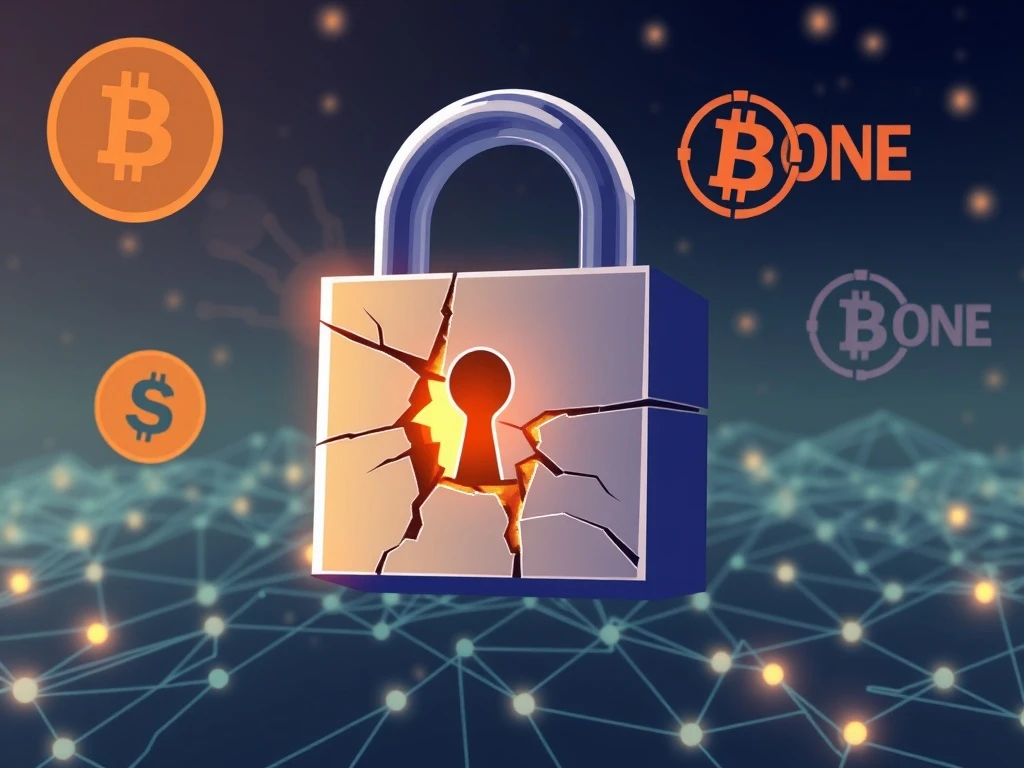Urgent K9 Finance Bounty: $23K Offered After Devastating Shibarium Exploit

The cryptocurrency world recently witnessed a significant security incident. K9 Finance, a key player in the Shiba Inu ecosystem, has offered a **K9 Finance bounty** of 5 Ether, valued at approximately $23,000. This urgent offer targets the attacker behind a substantial **Shibarium exploit** that drained about $2.4 million in digital assets. The team hopes to recover the stolen funds, highlighting a critical moment for **Shiba Inu DeFi** and the broader crypto community.
Understanding the Shibarium Exploit: A $2.4 Million Blockchain Hack
The **Shibarium exploit** unfolded on a Saturday, leading to a loss of around $2.4 million. Malicious actors gained access to validator signing keys. This breach allowed them to execute unauthorized transactions. They utilized a flash loan to acquire 4.6 million Bone ShibaSwap (BONE) tokens. Consequently, the attacker achieved majority validator power. They then signed a malicious transaction, moving the funds out of the bridge. This sophisticated **blockchain hack** underscored vulnerabilities even in established decentralized finance platforms.
Following the attack, the Shibarium developers reacted swiftly. They paused stake and unstake functions on the network. Additionally, they moved stake manager funds into a hardware wallet. This wallet is now controlled by a multisig, adding an extra layer of **crypto security**. Developer Kaal Dhairya confirmed they have contacted authorities. However, the team remains open to direct negotiations with the attacker. This dual approach aims for both legal recourse and potential fund recovery.
K9 Finance’s Bold Bounty Offer and Conditions
In a bold move, K9 Finance issued an on-chain message to the attacker. The message explicitly detailed the **K9 Finance bounty** offer. This offer, worth 5 Ether, will remain open for 30 days. The protocol also added a critical deadline and condition. Specifically, the bounty amount will begin to decrease after seven days. K9 Finance stated, “Settlement is atomic when we call recoverKnine(). If you call accept() we cannot cancel the deal. Code is law.” They urged the attacker to “act fast,” emphasizing the time-sensitive nature of the negotiation.
This bounty offer serves as a significant attempt to mitigate the damage. It provides a potential path for the attacker to return the funds. For the **Shiba Inu DeFi** community, this incident represents a major test of resilience. The transparency in offering a bounty publicly also signals a commitment to resolving the issue. This proactive stance is crucial for maintaining trust in the ecosystem.
The Impact on Shiba Inu Ecosystem Tokens and Broader Crypto Security
The **Shibarium exploit** immediately impacted tokens within the Shiba Inu ecosystem. Investors reacted to the news, causing notable price drops across the board. The Shiba Inu (SHIB) token fell from $0.0000145 to $0.0000131, representing a 7% decline. Similarly, the K9 Finance (KNINE) token saw a 10% drop, moving from $0.00000287 to $0.00000257. Meanwhile, ShibaSwap’s token, BONE, experienced the most significant hit, suffering a 38% drop from $0.31 to $0.19 since Sunday.
These price fluctuations highlight the immediate market sensitivity to **blockchain hack** events. Such incidents erode investor confidence, at least temporarily. The focus on restoring network security and safeguarding user assets remains the team’s top priority. They are actively collaborating with leading security teams. Partners include Hexens, Seal 911, and PeckShield, all investigating the incident thoroughly. This collaborative effort aims to identify the vulnerabilities and prevent future occurrences, bolstering overall **crypto security** measures.
Navigating the Aftermath: Developer Response and Community Trust
Shiba Inu developer Kaal Dhairya has been transparent throughout this crisis. He assured the community that resolving the **Shibarium exploit** is paramount. The team’s immediate actions, such as pausing functions and securing funds, demonstrate their commitment. They understand the importance of restoring trust. Therefore, they are working tirelessly with experts. These security teams bring specialized knowledge to the investigation. Their goal is to ensure the integrity of the Shibarium network. This process involves a detailed forensic analysis of the attack vectors. Ultimately, they aim to implement robust preventative measures.
The incident also serves as a stark reminder for all **Shiba Inu DeFi** users. It emphasizes the ongoing risks associated with decentralized platforms. While DeFi offers immense potential, it also presents unique security challenges. The community’s vigilance and understanding of these risks are essential. Developers must continuously enhance security protocols. Regular audits and bug bounties become even more critical in this landscape. This continuous improvement fosters a safer environment for users and investors alike.
The Broader Landscape of Crypto Security: Lessons from Recent Hacks
The **Shibarium exploit** is not an isolated incident. It reflects a concerning trend of increasing **blockchain hack** attempts in the crypto space. Just recently, THORChain co-founder John-Paul Thorbjornsen (JP Thor) lost $1.35 million. On-chain investigator ZachXBT reported this personal wallet drain. It resulted from a meeting call scam on Telegram. These varied attack vectors demonstrate the evolving nature of threats. From sophisticated bridge exploits to social engineering scams, bad actors constantly adapt their methods.
This pattern underscores the critical need for enhanced **crypto security** across all platforms. Projects must prioritize comprehensive security audits. Users, in turn, must practice extreme caution. They should verify all communications and secure their personal wallets diligently. The **K9 Finance bounty** offers a unique approach to recovery. However, prevention remains the best defense against such devastating losses. The industry must learn from each incident to build a more resilient and secure decentralized future.










